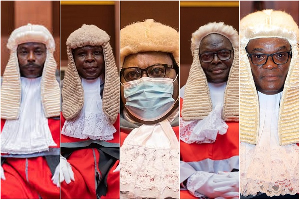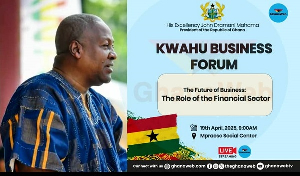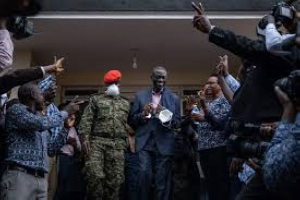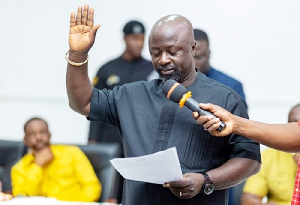The relationship between Ghana and the Bretton Woods Institutions
The first part of this three-series-analysis (published by MdernGhana.com 2010-02-20) dealt with the origins and their dynamics of the Bretton Woods institutions of the International Monetary Fund (IMF) and the World Bank Group (WB) since their establishment in 1944 at Bretton Woods in Newhamshire in the United States of America. This part, which is the second, examines Ghana’s relationship with the institutions since the mid 1960s. Overall, the analyses aim to contribute to previous and current debates on whether or not it is worthwhile for the country to continue to look up to the institutions for direction in her development effort after about four decades (1966-2006) in that regard.
The first attempt to introduce conditions-tied lending into the development process of Ghana by the Bretton Woods institutions was in 1965 when the Nkrumah administration approached the institutions for financial assistance to help the country out of its economic downturn at the time. This was because the country’s economy was challenged by balance of payments difficulties, which was largely attributed to external shocks. According to some analysts, the world market price for Ghana’s cocoa, which was the main source of her foreign exchange, had plummeted due to over production of the commodity causing the balance of payments deficits. Others also blame the balance of payments difficulties on the Nkrumah administration’s developmentalist or ambitious development and Pan Africanist agenda. Whatever the reason might have been, Ghana was facing economic downturn and needed external bail out.
After assessing the situation, the Bretton Woods prescribed liberal economic policy ideals as solution to the downturn. That meant drastic cuts on government expenditure and the government’s socioeconomic development agenda. The administration found the prescription unacceptable due to its socialist or developmentalist agenda. Unfortunately, the administration lost power in 1966 and that makes it difficult to determine whether the country could have tackled the economic downturn without the financial support of the Bretton Woods institutions. This is particularly so because the National Liberation Council (NLC) administration that ousted the Nkrumah administration accepted and implemented the policies until it handed over to the Busia administration in 1969.
Although Busia was determined to continue with the liberalisation process, his attempts appeared to have been hindered by his Finance Minister, the good old J. H. Mensah, who served in the same capacity under the NLC administration. According to analysts, the Finance Minister was worried about the political backlash against the austerity nature of the liberalisation policies, which included job losses, cuts in government social and economic subsidies, etc. The stalemate made Busia to split the Ministry into two and placed the Economic Planning division directly under his care. He then decided to accommodate the institutions’ advisers there to advise him on matters concerning the economic. Based on the institutions’ advice, the administration introduced further liberalisation policies in its 1971 budget policy statement. These included an upward valuation of the Cedi, cuts in government expenditure and further rolled over government social policy programmes. According to some analysts, that led to the 1972 coup ushering in the Acheampong regime.
Given the unpopularity of the liberalisation policies, the Acheampong administration did not only reverse the Bretton Woods supported policies introduced by its predecessor but it also renounced the country’s dealings with the institutions until Acheampong lost political power in 1968. In order to fill the vacuum created by the absence of external funding, the administration resorted to domestic resource mobilisation. The key aspect of that effort was the reliance on agricultural production for domestic consumption, industrial use and export. The plan achieved some success in the first few years of the administration. What appeared to have marred the domestic mobilisation efforts were the oil price hikes of the mid 1970s and what some analysts refer to as rent seeking in officialdom or political corruption. This led to public insurrection against the regime leading to the so-called palace coup that brought Akuffo into the Ghanaian political scene in 1968.
Unlike the Acheampong administration, that of Akuffo accepted and implemented the liberal economic policies of the Bretton Woods institutions. That once again led to the uprising of 1979 by Rawlings although the latter claimed his action was meant to cleanse the Ghana Armed Forces of indiscipline. Guided by the public outrage against the Bretton Woods liberalisation policy ideals, the Limann administration hesitated in accepting them. While the administration was still in that hesitant mood, Rawlings staged his second military takeover in 1981. However, the Rawlings’ administration soon found itself in the same situation as it was caught between relying on domestic mobilisation like that of Acheampong and accepting the Bretton Woods liberalisation policies. While the choice of the former had the tendency of forfeiting the administration external financial support, the latter would incur the usual public outrage against the administration.
The administration opted for the former with the hope that it could solicit support from the former Eastern Block and socialist inclined countries such as Libya, Cuba and others. However, that eluded the administration, as it could not mobilise the necessary support from those sources. That, coupled with the debt crisis referred to in the first part of this analyses, the famine in 1981, the returnees from Nigeria and the bushfires that gathered the country in 1983, left the administration with no option than to turn to the Bretton Woods for the conditions-tied policies with their associated socio-political challenges.
Thus, since 1983 up to 2006, the Bretton Woods institutions have largely led Ghana’s development process. Supporters of the Bretton Woods policy ideals argue that the policies have contributed significantly to political and economy stability in the country. According to them, while the policies helped to recover the economy from negative growth rate of about 7% GDP before the implementation of the policies achieving a sustained average growth rate of about 4% GDP in the 1980s and 1990s, the intermittent political insurrections that characterised the country in 1970s were halted during the implementation of the policies. Critics, however, argue that while political stability violated individual and civil liberties, the liberalisation policies failed to tackle the country’s structural development challenges.
On the economic front, critics contend that the 1966 policies, for instance, failed to address the structural challenges that resulted in the balance of payments difficulties, which the policies aimed to resolve. They argue that the liberalisation policies concentrated on reducing demand for imports to resolve balance of payments deficits but failed to invest in the agricultural and manufacturing industries to increase local production for domestic consumption in order to reduce demand for foreign goods. By doing so, the policies failed to diversify the economy from over reliance on primary commodity exports. Thus, the failure to do this increased local demand for imports thereby worsening the balance of payments problems. Similarly, the 1983 liberalisation failed to do the same and that has left the country’s economy at the mercy of recurrent external shocks in terms of crude oil price hikes and falling world market commodity prices. Critics also argue that while the country had paid much of her debts during the liberalisation process, the PNDC and NDC administrations that implemented the policies, left office with huge debts leaving her with no option but to be cleared HIPC. Finally, critics argue that the liberalisation policies failed to generate the needed economic growth leaving over 40% of the population in abject poverty by 2000.
As indicated in the first analyses, it was for this reason that the Bretton Woods institutions introduced the enhanced Structural Adjustment Programmes in 1996 and the enhanced HIPC initiative in 1999. The purpose of these policy reforms was to generate growth that was lost under the implementation of the SAPs in order to help reduce poverty. To contain criticisms regarding the undemocratic nature of the SAPs, the HIPC, through the Growth and Poverty Reduction Strategy (GPRS) process, was supposed to ensure that participating countries take control of their development programmes or have a greater say in the determination of their development priorities. It was against this backdrop that the Kufuor administration declared Ghana HIPC in 2001.
HIPC relief in terms of debt forgiveness helped pumped external resources into the economy since then. This did not only enhance economic growth but it also resulted in the country purging itself of IMF conditions-tied borrowing in 2006 allowing her to borrow from the capital market at its own terms. The release from the IMF “strangled-hole” also allowed the country policy space to pursue self-determined policies leading to an economic growth rate of over 7% GDP at the end of 2008. It has been difficult to determine whether the country could have continued to tackle her development challenges without the Bretton Woods financial support. This is due to the domestic energy crisis in 2007, the crude oil and food price hikes as well as the global economic downturns in 2008 since that contributed to the over 14% GDP deficit at the end of 2008 resulting in the return of the country to the institution’s conditions-tied borrowing in 2009 by the current administration.
In sum, this analysis illustrates Ghana’s relationship between the Bretton Woods institutions of the IMF and the WB since 1966 to date. The third and final part of the analyses will examine debates on whether or not Ghana should purge herself of institutions’ conditions-tied support.
Many thanks, appreciate the time you have spared to read this. I believe strongly that together we can find lasting solutions to our country’s development challenges.
S. A. Achanso
Ph.D. Candidate
Social Policy Research
University of Lincoln
UK.
Opinions of Friday, 26 February 2010
Columnist: Achanso, S. A.




![Thomas Partey [L] in a hug with Coach, Mikel Aterta Thomas Partey [L] in a hug with Coach, Mikel Aterta](https://cdn.ghanaweb.com/imagelib/pics/715/71574503.295.jpg)









